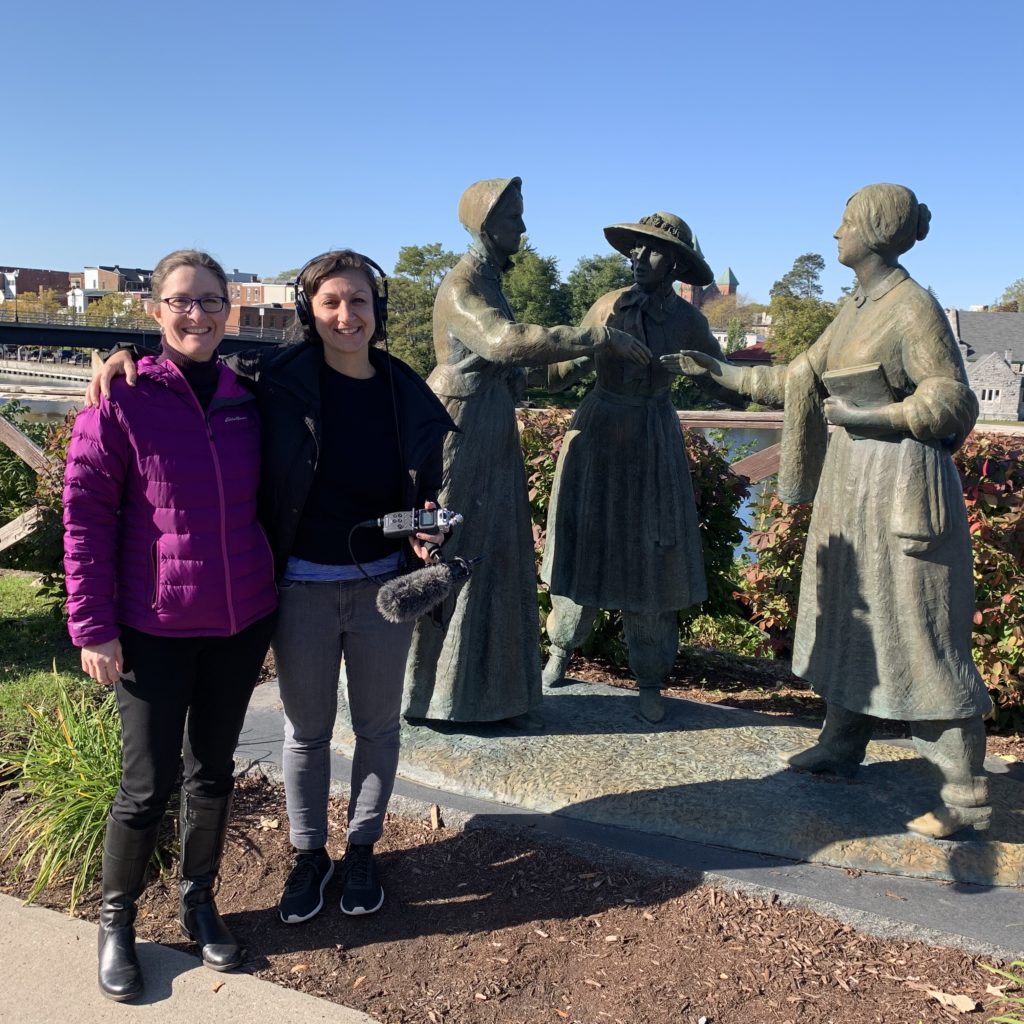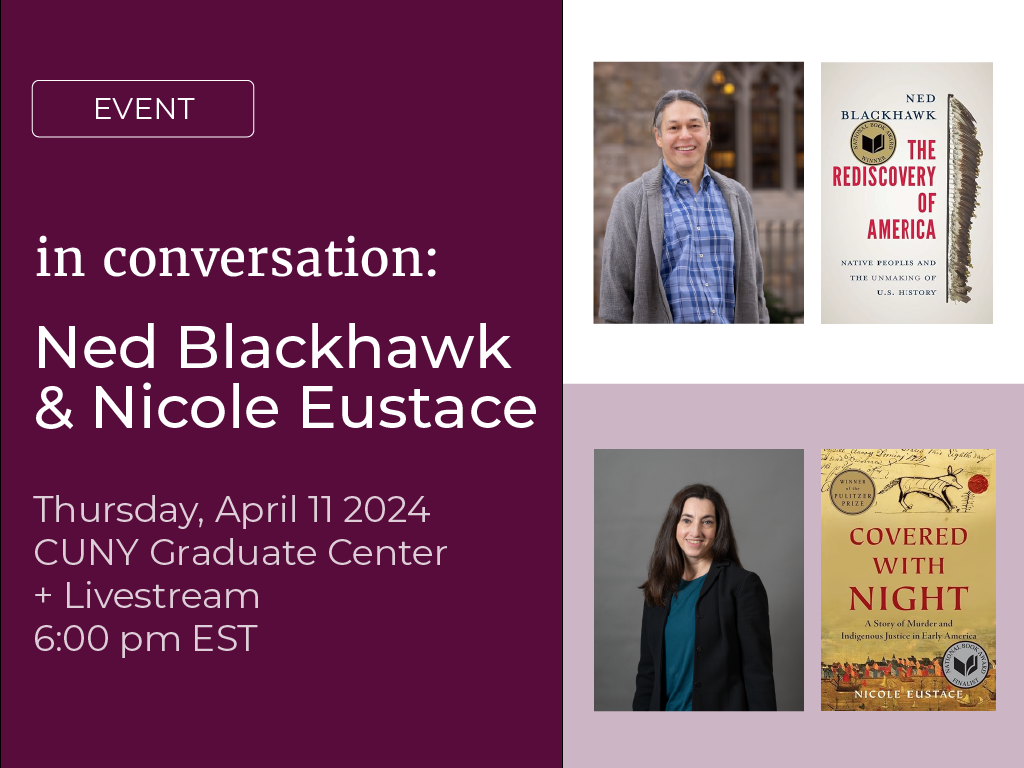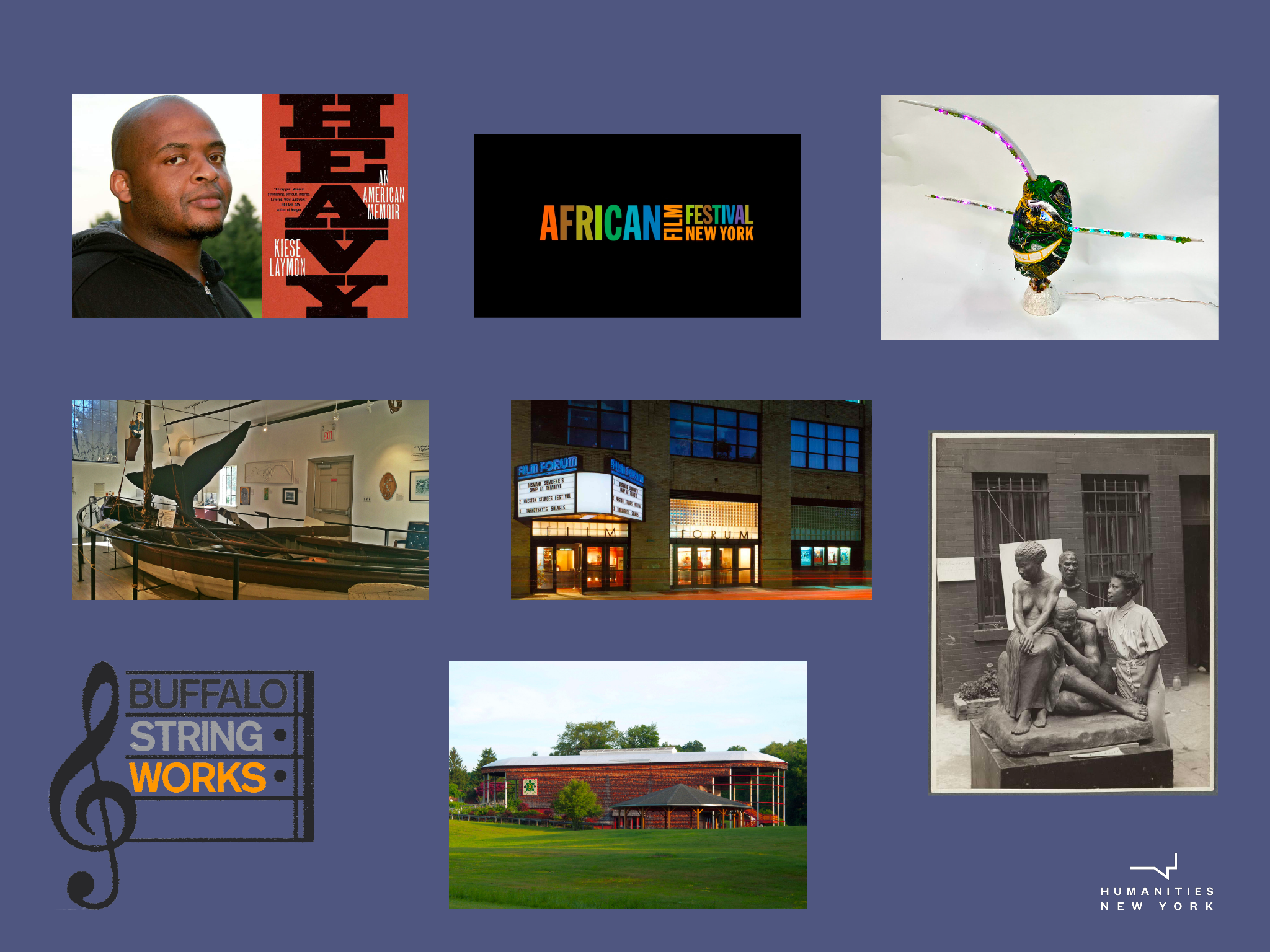This bonus episode takes listeners behind-the-scenes of Amended. “Amended in Action” is a radio series hosted by Michael Riecke that expands on the themes of Amended and amplifies contemporary women’s voices. Michael’s a reporter for WRVO and assistant professor of broadcasting and mass communication at SUNY Oswego. For a recent broadcast, Michael interviewed Laura Free, Amended host and writer, and Reva Goldberg, producer, editor and co-writer, about what it’s like to make the podcast.
Sara Ogger: Hi Amended listeners! I’m Sara Ogger, Executive Director of Humanities New York. We’re the organization behind Amended. On this show, you usually hear directly from your host Laura Free. But today we want to share an unscripted conversation that takes you behind the scenes of the show. “Amended in Action” is a radio series from WRVO. It expands on the themes of our podcast and features the voices of contemporary women. The host is Michael Riecke, Assistant Professor of broadcasting and mass communications at SUNY Oswego. Michael recently invited Laura on his show, along with our producer, Reva Goldberg, and asked them to talk about making the podcast. I’m excited to share that interview with you today. On behalf of Humanities New York, thank you for listening. And here’s Michael.
Michael Riecke: This is Amended in Action. I’m your host, Michael Riecke. This series showcases contemporary efforts that challenge injustice, illuminate truth, and raise women’s voices. One of those efforts you just heard on this station. I’m talking about this program’s counterpart, the reason this show exists: The audio series Amended.
Laura Free: Yeah. Well, the idea came from the team at Humanities New York, and they were looking at the suffrage commemoration of 2020 and wanted to engage with suffrage history in a more meaningful way than simply a celebration.
Michael Riecke: That’s Amended’s host and co-writer, Dr. Laura Free. Laura is an associate professor of history at Hobart and William Smith Colleges in Geneva. She’s also the author of Suffrage Reconstructed: Gender, Race, and Voting Rights in the Civil War Era. The topics and themes we hear in Amended are part of Laura’s expertise.
Laura Free: This is my wheelhouse. Yeah, definitely.
Michael Riecke: Laura found herself to be less of an expert when it came to sharing history through audio,
Laura Free: You know, I was familiar with podcasts, but I was not the podcast fiend in our household. That honor goes to my husband. But, you know, I listened to some before, and I thought it would be a really interesting project. And then I met Reva. . .
Michael Riecke: She’s referring to Reva Goldberg, a Brooklyn based freelance audio producer with at least one tie to upstate
New York.
Reva Goldberg: I went to Syracuse University. So I know a little bit about CNY. I’ve lived there.
Michael Riecke: Humanities New York called on Reva in the summer of 2019 for advice on creating an audio series that would uncover some of the untold stories of the women’s suffrage movement.
Reva Goldberg: I think they were looking to me to say, well, this is what it would actually take to make it, here are some of the things you need to be thinking about. But we had such a great brainstorming session that they and I both wanted to kind of keep the conversation going. And they decided to then bring me on to start piloting it and start budgeting it, and all of that.
Michael Riecke: The pilot episode was deemed a success. It helped bring in additional funding to get the full project off the
ground.
Reva Goldberg: We decided to work together in a more long-term way to make the whole series after that. And, you know, after I got to go meet Laura and start working with her back in the time when we were still doing a lot of field recording and traveling to places–pre-pandemic times–and Laura and I just really hit it off.
Michael Riecke: Reva and Laura found a creative rhythm that worked.
Laura Free: You know, I had the expertise in the suffrage history and know nothing about audio, and Reva is a brilliant audio storyteller and perhaps was less familiar with women’s suffrage history. And so I think that created a really good partnership, but I don’t want to speak for Reva.
Reva Goldberg: Laura and I have joked about this before, but I always say that historians seem to tell stories backwards, where they give you the evidence first, and then they tell you how they got there. And so my job is to sort of not only streamline and simplify, but also reverse engineer. So I’m fighting, you know, we have these different instincts that are kind of almost opposite.
Michael Riecke: Laura’s instincts are rooted in her work as a scholar of history. Details, context, sources, evidence.
Laura Free: This is something Reva and I grapple with a lot in our script writing. You know, I produce these things that have lots and lots of detail and lots of evidence. And let me explain all of the minutiae of how this is operating historically. And Reva’s like, you can’t do that in audio, Laura. It’s just, nobody will listen. And so, you know, I do feel a tinge of pain sometimes that some pieces are being left out. And that’s the nature of the medium, I think. But I think in terms of getting people engaged and being a way to access these stories and to reach people who may never have considered themselves interested in history, it’s amazing.
Michael Riecke: Reva came to the projects with a moderate interest in history. She thought she knew a fair amount about the struggle for women’s suffrage before she started working on Amended, but it turns out Amended provided Reva with a new perspective.
Reva Goldberg: Almost everything I learned was either, you know, completely changing what I thought I knew, or just something I had never even heard before. So it was an entirely, it was a huge learning experience for me. I think my favorite sort of non-factoid thing that I learned from some of our guests was the extent to which there are people sort of living and walking among us who really connect with and channel specific people in the past. In episode one, Judy Wellman was like that for me. When she sat with us in Seneca Falls, she spoke about these people as if she really knew them.
Michael Riecke: That day, Reva was managing the audio gear while Laura played the role of interviewer inside the chapel where the Women’s Rights Convention took place.
Laura Free: Judy, if we were sitting here on July 19th and 20th in 1848, who would be joining us in the pew?
Judy Wellman: Thomas James is here, I suspect, because he’s a trustee of the Wesleyan Methodist Church and has been very active in abolitionism.
Reva Goldberg: We asked her, you know, what are the conversations you hear in the room on this, you know, sweltering summer afternoon when this convention took place?
Judy Wellman: And maybe his daughter Martha’s over there too.
Reva Goldberg: Or, who lived down the street? And what did they do for a living?
Judy Wellman: Right over there I see Charles Hoskins. And everyone knew Charles because he kept the largest general store in town.
Michael Riecke: Even for Laura, who’s written a book on women’s suffrage, some of the stories that she stumbled upon while producing Amended were new to her.
Laura Free: That’s part of the joy of doing research and, for any kind of project, is that you’re always learning new things. So, you know, for episode two, I had, of course, I taught Harriet Jacobs for years. I knew her story very well. I knew Celia’s story very well, and I included her story in some of my lecture materials, but I didn’t know about Charity Castle.
Laura Free: Twenty-nine-year-old Charity Castle is one of the eight enslaved people Harriet takes with her to Philadelphia. Charity has also been subject to Charles’s violence. So leaving with Harriet offers a small degree of escape for her. But legally, she’s still Charles’s property.
Laura Free: Um, that was a really interesting and new story for me. So that’s just an example, but in every episode I learned something completely new.
Michael Riecke: Reva and Laura say throughout the process, they took great care to accurately portray the essence and the voices of the historical figures the series profiles.
Laura Free: I felt a deep responsibility to honor and respect the stories of these women. It felt somehow more important to get that right than it did for me writing my book about Elizabeth Cady Stanton, right. That like, I think we had an obligation to do our best to bring their stories to light. I’m going to take away from this experience that Reva taught me is, you know, in thinking about people’s stories, you have to always be asking a few questions: What do they want? What will they do to get it? And who’s getting in their way? And so that, I think, also helped us think about for these women in particular, what do they want? Freedom, bodily, autonomy, the right to control their own lives. What are they going to do to get it? They obviously exhibit a wide range of actions that they are willing to take. And you know, who are the people who are getting in their way? They are enslavers, obviously. And so, you know, thinking about it in that way also helped us to, I think, do justice to their stories.
Reva Goldberg: And we still, with every episode, we’re really pushing ourselves, even though we’re talking about someone in the past, to really try to understand what they wanted, and what was in their way, and how they tried to get it. And that sort of forces us to really find the narrative. And then everything else sort of supports that or it kind of falls away, because we really want to connect with that person and what they were trying to do, what they were up against. And that sort of always forces us to make sure we’re telling a really good story and that we’re not launching into a lecture or bullet points that we want to make sure the listener takes away. We really want to bring them along for a journey with that person whose world we’re trying to immerse them in.
Michael Riecke: Part of immersing the audience into the story involved taking the listener to the places where these women lived, to sites where history unfolded. When Reva and Laura started production in fall 2019, that was possible.
Laura Free: One of the great things about the project as it was initially conceived was that we would be going to places that had meaning to the stories that we would be telling, and bringing historians or artists or people who had information about the space and the story with us to those places. And there was something just incredibly special and almost magical, really, about getting to do those interviews in places like the chapel at Seneca Falls, talking to Judy Wellman, the premier historian of the Seneca Falls women’s rights meeting. And so it was just really special as a historian to get to participate in that. And so the pandemic obviously put a stop to all of that. But it’s also, I think, pushed us to try to be creative in thinking about how can we bring meaning to these stories if we’re not actually in a space with a person? What are some ways to make the story rich without that?
Michael Riecke: Amended creeps forward in time as the series progresses, introducing new struggles facing new generations of women.
Laura Free: So the third episode is about a black woman activist, Frances Ellen Watkins Harper, who was an advocate for abolition, education. She was an author, a poet, an amazing person. Also a suffragist. And so her story is episode three. Then the next three episodes start to move us into the 20th century. And so the fourth episode is about women’s labor rights activists in New York City. It’s their stories connected to the very famous Triangle Shirtwaist Factory Fire. And we explore their labor activism and how it aligns with suffrage. Then the fifth episode is about a young Chinese activist named Mabel Lee, who is an immigrant to the United States and an advocate for women’s voting rights and equality in both China and the U.S. And then our final episode will be about a set of native American women’s activists who advocated both for tribal sovereignty and for U.S. citizenship and voting rights for Native women. And that’ll take us through to the Voting Rights Act of the 1960’s, and then beyond to the present moment.
Michael Riecke: The final episode marks the culmination of a project that began nearly two years ago. I asked Laura if she would do it again.
Laura Free: With Reva? In a heartbeat, yes, absolutely. I would need to ask for academic leave for the duration, however. One of the challenges for me has been that I have been teaching full-time through this whole experience. And so, you know, juggling, this was a very different kind of commitment than doing your own scholarship. You know, when you’re kind of writing on your own, you can wedge it into those little moments. And this requires a much greater chunk of time, a greater collaborative space than I’m used to. And so, yeah, I would absolutely do it again, but I would need to put a hold on my day job.
Michael Riecke: For Reva, producing audio is her day job, but this project has changed how she frames her work.
Reva Goldberg: I think I actually now think of myself as someone who makes history podcasts, someone who makes educational podcasts, someone who, you know, has over the course of the past year-and-a-half developed some great tools for helping to make pretty complex history into something that can be publicly accessible and immersive.
And so, yeah, I would love to do that again.
Michael Riecke: You can learn more about the audio series Amended, listen to past episodes, and explore photos and digital archives at humanitiesny.org.
Michael Riecke: Thanks for listening to Amended in Action. Special thanks to WRVO Public Media, Humanities New York, and SUNY Oswego School of Communication Media and the Arts. Music provided by Fesliyan Studios. Until next time, I’m Michael Riecke.
Sara Ogger: Thanks for listening to this Amended in Action segment produced by Michael Riecke and featuring Laura Free and Reva Goldberg. I’m Sara Ogger, executive director of Humanities New York. Visit humanitiesny.org and subscribe to the newsletter. You’ll be the first to learn about our next podcast, or special event, or grant opportunity. We’ll see you next week!
“Amended in Action” Credits:
“Amended in Action” is produced and hosted by Michael Riecke. It was originally broadcast on WRVO Public Media with Amended Episode 2. Music by Fesliyan Studios.
The Amended Team:
Production Company: Humanities New York
Laura Free, Host & Writer
Reva Goldberg, Producer, Editor & Co-Writer
Scarlett Rebman, Project Director
Vanessa Manko
Sara Ogger
Michael Washburn
Art by Simonair Yoho
For this bonus episode of Amended:
Music: Live Footage
Amended is produced with major funding from the Carnegie Corporation of New York, and with support from Baird Foundation, Susan Strauss, Hobart and William Smith Colleges, Phil Lewis & Catherine Porter, and C. Evan Stewart.



